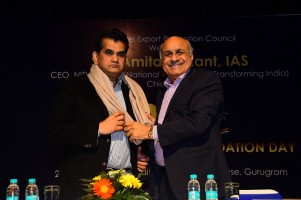
Low productivity, absence of competitive products hindering exports: NITI Aayog
The Dollar Business Bureau
Low productivity growth and absence of competitive products are two main factors that have been hindering the export sector of the country, according to a report by the the NITI Aayog.
The 'Three Year Action Agenda 2017-20' of the NITI Aayog, which was unveiled by the Finance Minister Arun Jaitley on Thursday said, “On the demand side, Indian firms often complain that there is inadequate demand for their products. Yet, the world market in merchandise exports at $16.6 trillion in 2015 is extremely large."
Citing the reasons for Indian companies not been able to take the benefit of this huge demand, the report said, “The possible explanation is that Indian products are not competitive in the world economy.”
The global economy discipline is what leads to speedy growth in productivity, it added.
“Indian exporters have to compete with the world’s best and must therefore continuously work on upgrading technology, product quality and management to be competitive,” the report said.
The report pointed out that Indian companies are lagging behind with regards to economies of scale. Several Chinese super-competitive companies employ not only tens of thousands of employees but hundreds of thousands. However, there are hardly any companies in India which are employing workers in such numbers.
Over 90% of apparel workers that were employed in Indian companies had just 50 workers or less in 2005. On the other hand, the corresponding figure in Chinese companies was below 15% in the same year, the report detailed.
Putting emphasis on the export sector’s potential in the creation of jobs in the country, the three-year vision document said, that exporting companies have to maintain high productivity, which in itself translates to higher wages for their workers.
“Recognising this critical role of exports in the creation of well-paying jobs, India needs a focused strategy for creating an environment in which export competitive firms can emerge, especially in labour intensive sectors,” it said.
Jaitley, while releasing the report, said that the expectations of Indians for high economic growth puts pressure on the political class, which is resulting in easier, speedy decision-making at the Centre as well as state levels.
“Indians are increasingly becoming restless and expect higher growth rates and higher levels of activity to happen,” he said.
Now, one will find that not too many policy decisions caught in the pipeline as it is not comfortable or politically convenient to take those decisions,” he added.
The Finance Minister also said that the expectations of ‘aspirational class’ of the country was putting pressure on the state governments as well.
“Across the country, states are positioning themselves as to who can better the others in ease of doing business. They are competing to attract investment,” he said.
In this regard, the Action Agenda by Niti Aayog suggesting action programmes and policy changes for the coming three years has the potential to serve as a good text book for the governing class Jaitley added.





 to success.
to success.